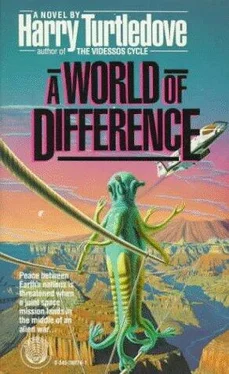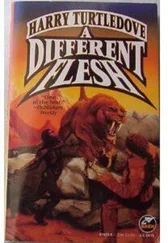“Something to that,” he admitted.
“At the time,” she recalled, “I wanted to kill him.”
“You and NASA both,” Bragg said. “The scientists, any how. I was just getting into the program then, and I think the administrators all wanted to give Reatur a big fat kiss, for guaranteeing them all the budget they wanted from then on. They saw farther down the road than the whitecoat boys.”
“That makes once,” Sarah said tartly. Not being enamored of the NASA bureaucracy, she added, “We could have got here three years faster if we’d just piled up all our paperwork into one stack and walked from Earth.”
Bragg let out a loud bray of laughter, then half choked trying to swallow more. “Got to keep quiet,” he reminded himself. “Everybody’s asleep. Now that we’ve got a world making day and night for us again, no more sleeping by schedule-naturally, soon as I’d finally got used to it.”
Sarah looked at her watch. “Half past two,” she said. “I didn’t know it was that late.” She yawned, almost as if by reflex. “Even the extra forty minutes a day we get here won’t help much. Let’s go to bed.”
“Best offer I’ve had today so far.”
Sarah had been turning away. Now she glanced back at him sharply. His tone had been easy, but he was watching her, too.
Marksman’s eyes, she thought again, discomfited.
“To sleep,” she said, ready to be really irritated if he made something of that. He didn’t. But as she walked out of the galley, she still imagined she felt his gaze on her back. She did not turn around again; she was just as glad not to know for sure.
The sun skipped in and out from behind clouds. Ternat felt its warmth as he slowly walked south, back toward his father’s castle from the domain of Dordal. Summer really was on its way, he thought. The warm weather fit in well with his sour mood.
Reatur had said Dordal was an idiot, the domain master’s eldest remembered. If anything, that had been generous of Reatur. Dordal cared not a runnerpest voiding for the threat from across the Ervis Gorge. His eyestalks had wiggled until Ternat thought-hoped-they would fall off. Reatur’s eldest was not used to being laughed at. He did not care for it.
He did not care for anything about Dordal’s domain. Its crops were scrubby, and of varieties he did not like. Of its meat animals, the massi were too fat and the eloca too thin. Half the herders chewed ompass root-good luck to them if those scrawny eloca ever got loose and started running all over the landscape.
Maybe ompass root was Dordal’s problem, too, Ternat thought. His hands closed as he disagreed with himself: he would have smelled the fumes from the root. Dordal was a happy fool all by himself.
He had not even cared to learn about humans, though the bellow of their flying house had been heard in his domain. Some quiet questioning among the younger males in Dordal’s castle had made that plain to Ternat. But Dordal dismissed the roar as “a freak storm” and could not imagine humans as anything but ugly people.
Ternat almost sympathized with that. Dordal was plenty ugly himself.
The sun came out again and stayed out. The weather got warmer and warmer-easily warm enough to melt ice, Ternat thought. Yes, it was shaping up to be a miserably hot year. The humans might enjoy it-they were and somehow stayed hotter than anything alive had a right to be-but the excess melt it would cause would only make trouble and work for people.
As if thinking of humans were enough to summon them into his presence, Ternat saw a couple of their traveling contraptions leaning against a large rock. Ternat envied them those gadgets. He wished he had one, but his legs were both too short and too many for the thing to do him any good. But the round legs the gadget had-and, come to think of it, the humans’ flying house, too-looked to be better for travel than skids, at least when snow was not drifted deep.
Behind the boulder, Ternat saw a human’s foot. To judge by the posture, the human was lying down. That might be interesting, he thought. Except when sleeping, humans were no fonder of being horizontal than people were. And humans, so far as Ternat knew, did not have the habit of sleeping at midday.
He stepped off the path so he could get a better view of what was going on back of the rock. It was not one human back there, he saw after a moment, it was two. Well, that made sense-one for each traveling contraption on the other side of the boulder. But they were lying together in such a tangle of arms and legs that he had to look with three eyes before he was sure.
Under their outer layers, he saw, humans had the same pinkishtan skins they did on their faces-at least their legs, the uncovered parts, did. Ternat wondered what they were doing. Humans did a lot of strange things, but he had never seen them at anything so strange as this before.
They separated and got up off the square of woven stuff on which they had been lying. They quickly began putting on the outer layers for their legs. They were too engrossed in that to pay any attention to Ternat and soon had the task done.
Before they did, though, Ternat noticed they were different. The taller one had a dangling organ that reminded him a little of his own male parts, though those only came out when he was with a mate. He was sorry for the human for having only one, and thought it ludicrous for the thing to be sticking out there all the time.
Then he thought about the other human, the male without the organ… He suddenly stood stockstill in the field as the possible meaning of that sank in. Given what he had watched, it made only too much sense.
He hurried back to the path and started home as fast as he could go. Reatur had to hear this news right away. Maybe he would know what to do about it.
Pat Marquard put on her long johns as fast as she could; the skin on her thighs and calves, wherever they had not pressed directly against Frank’s, was all over gooseflesh. She pulled her pants over the thermal underwear and bent down to put her socks and boots back on. That was when she saw the Minervan. “We’ve been watched,” she told Frank.
“Huh?” His head jerked up; he had been tying his boots, too. “Oh, it’s just a native,” he said in relief. He grinned a lazy grin at her. “Maybe he learned something.”
“Maybe he did.” She rolled up the blanket, shivering briefly at the idea of fooling around without it on this planet full of permafrost, then carried it around the rock and strapped it behind her bicycle seat.
She wondered if the Minervan would come over and try to talk with them, but he seemed to have business of his own. With a touch of regret, she let him go on. Still, she supposed Irv had a point when he recommended against forcing contact on the natives. Things could get nasty if Athena’s crew made themselves unwelcome.
“Shall we get going again?” Frank climbed onto his bicycle.
So did Pat. “Sure.”
“Only way to keep warm is to keep moving,” Frank said as he began to pedal. He grinned again. “Well, almost the only way.”
“Uhhuh.” Pat looked at the ground instead of at her husband. The alleged path they were riding on was rough enough that he saw nothing out of the ordinary there. But while Frank whistled cheerfully and his breath steamed out as if it were the traditional aftersex cigarette smoke, Pat was anything but satisfied.
Frustration stretched her nerves taut. She had been so sure a couple of miles’ worth of isolation would let her find the release she needed, but it had not worked out that way. Now she didn’t know what to do.
She knew exactly when things had begun to go wrong: aboard Athena. She had always needed privacy to relax when she made love, and a curtain spread in front of a cubicle was not enough. Every noise from outside made her tense up, fearing-irrationally, she knew, but no less powerfully on account of that-that she and Frank would be interrupted. After most of a year, failure became as ingrained as success had been before.
Читать дальше












